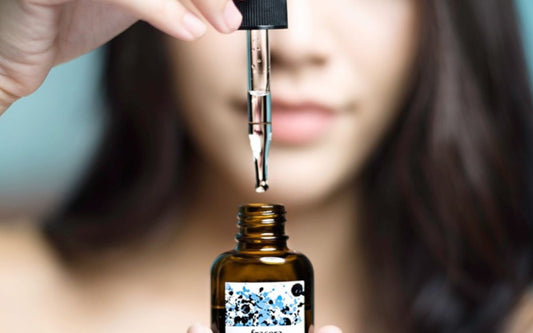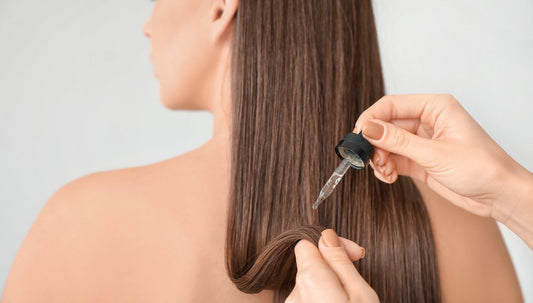Whether you're going for a quick 04-step morning routine or a detailed 10-step evening regimen, the order in which you apply your best skin serums can make a big difference. Why is this important?
Well, if your products aren’t applied in the right order, they might not be as effective. Also, keep in mind that the order of your skincare steps is different for day and night routines. So, pay attention to the details we’re about to share to get the most out of your regimen.
Keep reading to learn how to layer your products for the best results.
What Are the Best Times for Applying Serums: Day, Night, or Both?
The best time to apply serums really depends on the type of serum and your skin’s needs. Generally, applying serums both in the morning and at night can be beneficial.
In the morning, a serum with antioxidants like Vitamin C can help protect your skin from environmental damage and brighten your complexion. At night, a serum with ingredients like retinol or hyaluronic acid can work on repair and hydration while you sleep.
So, if you’re up for it, using serums both times can give you the most benefits and help your skin look its best around the clock.
Which type of serum is best for glowing skin?
For glowing skin, serums rich in ingredients that enhance radiance and even out skin tone are your best bet. Vitamin C serums like Sunscreen Serum - Zinc Oxide are highly effective because they brighten the skin and combat dullness.
Likewise, hyaluronic acid serums like Hyaluronic Acid Serum—Vitamin B5 help plump the skin and maintain hydration, giving it a healthy, dewy glow. Similarly, niacinamide serums like Misty Brightening Serums Niacinamide is also great for improving skin texture and reducing redness, which can contribute to a more radiant complexion. Additionally, retinol serums like Anti-aging serums 1% Retinol can boost cell turnover and fade dark spots, leading to a brighter and more even skin tone over time.
If you’re hunting for the best serum for glowing skin in Pakistan, check out the different options at Misty. Their serums are getting a lot of love from customers these days. So, choose the best skin serums according to your skin type for both day and night skin care routines.
Is Serum whiten the Skin?
Serums can help improve the appearance of your skin and can contribute to a brighter, more even complexion, but they don't actually "whiten" your skin. Many serums are designed to address issues like dark spots, hyperpigmentation, and dullness, which can make your skin look brighter and more radiant. Ingredients like Vitamin C, niacinamide, and kojic acid are often included in serums for their ability to lighten dark spots and even out skin tone.
However, it's important to remember that they work to enhance your natural skin tone rather than change it drastically. Moreover, don’t choose serum for any brand that claims to whiten your skin because it may have ingredients to destroy your skin so much. This is why, search for the best medicated whitening serum in pakistan.
In short, ror the best results, consistency and a comprehensive skincare routine are key.
The Nighttime Routine: Setting the Stage for Skin Renewal
According to Dr. Idriss, the key to a successful skincare routine is to think of it as a weekly view rather than a daily one. This approach ensures that you're incorporating a variety of ingredients, treatments, and solutions throughout the week, leading to long-term improvements in your skin's health and appearance. Moreover, prefer organic skin care products over chemical ones.
Let's start with the nighttime routine, as this is where the real magic happens:
Micellar Water: Begin by using micellar water, such as the to gently remove makeup and impurities from the skin. Dr. Idriss recommends the Bioderma brand as her personal favorite, as it is gentle and effective.
Cleansing: Follow up with a cream cleanser and massage it into the skin to break up any remaining makeup or residue. Use a damp washcloth to remove the cleanser, leaving your skin refreshed and clean.
Exfoliation: This is a crucial step in your nighttime routine, as it helps to dissolve the bonds between dead skin cells and promote cellular turnover. Use a chemical exfoliant 2-4 times per week, depending on your skin type and the season. In the winter, when the air is drier, you may want to exfoliate more frequently to combat dullness and uneven texture.
Targeted Serums: After your prescription treatments, it's time to apply your targeted serums. It’s better if you limit yourself to 2-3 serums, as more can be overkill. One of her personal favorites is the 24K Gold Serums - Gold + Collagen , which is a multi-ingredient powerhouse designed to address a variety of skin concerns.
Eye Cream: Before applying your moisturizer, be sure to use an eye cream. Look for eye creams with ingredients like caffeine, retinol, or peptides, which can help to address specific eye area concerns.
Moisturizer: The final step in your nighttime routine is to apply a moisturizer, such as the anti-aging brightening cream. If your moisturizer contains active ingredients, be mindful of not "double-dipping" with your serums.
Occlusive Layers: As an optional final step, you can apply a face oil or an occlusive to seal in all the goodness from your previous steps, especially during the drier winter months.
The Morning Routine: Simplicity and Efficiency
While the nighttime routine is more extensive, the morning routine should be simpler and more streamlined. The goal is to prepare your skin for the day ahead, with a focus on hydration and sun protection.
Cleansing: Always start your morning with a simple water rinse rather than a full cleanse, especially if you have dry or sensitive skin. This helps to avoid overstripping the skin.
Targeted Serums: Next, apply your targeted serums, such as a vitamin C serum or a serum with ingredients like kojic acid, arbutin, or licorice root, to address specific concerns.
Moisturizer: Depending on your skin type and the climate, you may or may not need a moisturizer in the morning. If your skin is on the oilier side or the climate is humid, you can skip the moisturizer and go straight to sunscreen. For drier skin types or cooler, drier climates, a moisturizer is recommended.
Sunscreen: The final and most important step in your morning routine is to apply a broad-spectrum sunscreen. This is crucial, especially if you've been exfoliating your skin, as it helps to protect it from UV damage.
Combine Serums for Enhanced Benefits
Now that we've covered the step-by-step routines, let's dive into some key ingredient combinations that can amplify the effectiveness of your skincare products:
Vitamin C and Retinoids: Combining vitamin C with a retinoid can be a powerful anti-aging duo, as they work synergistically to improve skin texture, reduce the appearance of fine lines and wrinkles, and boost collagen production. For example, if you are choosing the products from Misty, combine Sunscreen serum Zinc Oxide with Anti aging Serum 1% Retinol.
Vitamin C and Copper Peptides: While vitamin C in the form of l-ascorbic acid should not be combined with copper peptides, as they can interfere with each other, you can safely use a vitamin C ester alongside copper peptides for a skin-nourishing boost.
Exfoliating Acids: When using exfoliating acids like glycolic, lactic, or salicylic acid, it's important to be mindful of the concentrations and not to overdo it. Consider using a lower concentration exfoliant in the morning, such as a salicylic acid cleanser, and reserving the higher concentration exfoliants for your nighttime routine.
Customize Your With the Perfect Balance
As Dr. Idriss emphasizes, the key to an effective skincare routine is finding the right balance and consistency over time. It's important to experiment and find the products and ingredients that work best for your unique skin type and concerns.
Remember, a successful skincare routine is not about using the most products or the most potent ingredients. It's about creating a balanced, personalized regimen that addresses your specific needs and helps you achieve your skin goals. By following the principles outlined in this blog post and staying consistent with your routine, you'll be well on your way to healthier, more radiant skin.
Conclusion
We’ve covered all the details on using the best skin serums for both morning and night. Now, pick the serum that best fits your skincare needs and enjoy the benefits of a radiant, glowing complexion.




